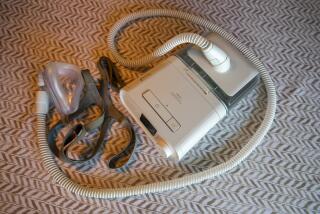Implants: A Connection to Cancer? : Medicine: The latest FDA advisory on surgeries and the order to implant makers to submit safety data have raised new concerns about the risks.
- Share via
When Kathleen was 23 and needed a little more self-confidence, breast implants seemed like a good idea.
Now, 14 years later, the West Los Angeles woman rues the day doctors implanted the silicone sacks in her chest.
Five years ago, one of the implants burst, and both were removed. Although she had doubts about them, Kathleen went home with new polyurethane-covered implants, touted to be trouble-free.
It seemed worth the $4,000 for the second surgery.
But Kathleen recently learned that the polyurethane foam-coated implants, manufactured by Bristol-Myers Squibb Co.’s Surgitek Division, may cause an elevated risk of liver cancer. The Food and Drug Administration has advised women considering breast enlargement with the foam-covered implants to delay surgery until a government safety study is completed.
Preliminary research shows that the foam degrades in conditions similar to the human body and produces a chemical, 2-toluene diamine (TDA), that has been linked to liver cancer in laboratory animals. To date, about half a million American women have received polyurethane implants.
The cancer scare is the latest blow to the billion-dollar implant business.
Based on a two-year investigation, the FDA earlier this month ordered all implant makers to submit safety data by July 9 or remove their implants from the market.
The FDA action has created a feeling of peril among many of the 3 million U.S. women with implants--and a fair degree of finger-pointing among consumers, physicians and manufacturers.
“I’m mad at the FDA for allowing something to be put on the market that might not be safe,” Kathleen says. “I’m sort of mad at myself for being vain. I guess I knew there was a risk when you put some foreign material in your body. When you’re 23 you don’t think about that. But when you’re 37 . . . you don’t want to take any risks.”
It is not yet clear what kind of risks, if any, women with implants face. The most common types are thin silicone sacks filled with silicone gel or, in some cases, a saline solution. In a third to half of cases, these implants cause a scar-tissue buildup around the breast, leading to breast hardening and deformity.
Silicone also can leech from the sacks and migrate to various parts of the body, which some women and their physicians claim can cause a debilitating immune-system disorder.
To alleviate the hardening problem, some surgeons in recent years have used polyurethane foam-covered implants. Although it is this implant that is under investigation for a link to cancer, the FDA has investigated all reports of implant problems for the last two years.
In an advisory last week, the FDA urged that women with any implants avoid having them removed until its investigation is completed, some time this summer. Results of a more detailed study of foam-covered implants, which Surgitek voluntarily withdrew from the market two weeks ago, could be available sooner.
Although FDA officials have acknowledged the need to review implant safety data, the agency has urged calm to avoid “an unnecessary climate of fear.”
Still, the government’s reassuring voice has not prevented many women from asking why implants, which have been available for almost 30 years, are only now being investigated as a health threat.
“Why was this allowed to be manufactured and used if, now, they are discovering a problem?” asks Carol, 41, of Calabasas, who has had no problems since her 1986 implants. “But then again, can a product ever be totally safe?”
The FDA investigation has left Tanya, a 45-year-old Sherman Oaks professional and a veteran of several cosmetic surgeries, feeling powerless as a consumer.
Before receiving her polyurethane-foam implants in November, Tanya diligently researched implant safety. She called the American Cancer Society to ask if there was a connection between implants and cancer. She was especially concerned whether implants would interfere with mammogram readings to detect breast cancer. (To some degree, implants have been implicated as interfering with mammography accuracy.)
“I am a very aggressive patient,” Tanya says. “I did a tremendous amount of investigation and research before I had the surgery performed because I had a lot of questions. I specifically wanted the polyurethane implant over the silicone. From what I had read, the polyurethane was a softer implant. The softer the implant, the better the reading of the mammogram.”
Tanya made the correct assumptions. And Dr. Neal Handel, of the Breast Center in Van Nuys, says women have a right to question why implants should be subject to safety concerns after so many years on the market.
“Plastic surgeons were using implants before there were mechanisms to make sure regulations were in place,” he says. “We’re doing the best we can to look at (the need for regulations) now.”
According to an FDA official, breast implants were unregulated until 1976, when the agency ordered manufacturers to submit data on safety and effectiveness before gaining approval. Implants on the market before 1976 were exempt, and most implants available today were in use before then. The FDA annulled that exemption this month, however, when it ruled that all implant makers must submit safety data.
“I think the fact that these concerns have been raised is a good thing,” says Handel, who has performed about 1,500 breast implant surgeries in the last 10 years and has published numerous scientific papers on implants and mammography with colleague Melvin J. Silverstein. In recent years, Handel says, he has favored using the polyurethane foam-covered implants because they are less likely to cause scar tissue buildup.
“I’m disappointed that an implant that I had a lot of confidence in isn’t available,” he says. “But we all want the safest possible products for our patients.”
Whatever the outcome of the FDA studies, some harm has already been done, says Dr. Nir Kossovsky, a UCLA researcher who has studied implants for 14 years.
“The worst thing you can do in this industry is say, 15 years later: ‘It seemed like a good idea at the time,’ ” says Kossovsky. “In medicine, you don’t like surprises.
“Even if (the FDA investigation of implant safety) turns out to be irrelevant, the whole process can be disconcerting. It destroys confidence in the system. The practice of medical care is grossly usurped when patients feel their physicians have not been forthright with them and when physicians feel manufacturers have not been forthright with them.”
Kossovsky says he became concerned 10 years ago about implant safety. As a biomedical device, implants overlap the fields of medicine and materials science. But instead of becoming the responsibility of both fields, he says, implant study fell between the cracks.
“Biomaterials kind of fell into the wastebasket between bio and hard science. The work is largely funded by industry, and industry is more interested in the applications” than human health concerns, he says.
Kossovsky, an FDA consultant on plastics, says not enough is known about how silicone reacts in the body: “There are a lot of things we don’t understand about how things work in the body. The body is an extraordinary hostile environment.”
Although implant manufacturers maintain that their products are safe, and they play down the importance of cancer in laboratory rats, Kossovsky warns against dismissing studies on the carcinogenic chemical TDA in laboratory rats.
“I wouldn’t discount it,” he says. “In the human being the breakdown occurs at a rather constant, slow rate. A slow rate could maybe be tolerated by the body. We just don’t know the answers to those things.”
Not knowing all the answers has taken its toll on business. Handel says his business has fallen 50% since the FDA report in what is usually a busy time of year. Other local implant surgeons report some women are canceling scheduled implant surgeries. All say they are deluged with calls from worried patients.
“We’ve had a lot of women call, but no one has actually said, ‘Let’s take them out,’ ” says Dr. Leonard Avedian, a Newport Beach plastic surgeon. His office has “been spending a lot of time fielding calls.”
Like other implant surgeons, Avedian says he still recommends surgery with silicone implants and is confident that the safety and effectiveness of all implants will be proven: “I think (implants) will be approved, but with more guidelines about instructing patients.”
Handel also is confident that implants will be cleared, and says the biggest problem with implants--the hardening around silicone implants--is not a major complication.
“It’s not a pleasant complication, but I do not think it’s a threat to a patient’s health,” he says. “Every single study that has been done has failed to show a higher incidence of cancer in women with breast implants. There are a lot of questions on silicone implants, but there are many products being marketed that are far more dangerous than silicone implants: cigarettes, motorcycles, convertibles. Not a single patient has died of a silicone implant.”
Handel says the worst part of the controversy is how it has upset patients, many of whom have been very satisfied until now.
“I feel very sorry for my patients. I know I would be frightened, upset and anxious.” But, he says, “I think the data has to be evaluated in a cool, dispassionate air.”
Many women with implants say they will try to do just that. Carol, of Calabasas, says she will rely on her doctor’s advice: “I feel he would contact his patients and give them the option of taking them out if they proved to be harmful.”
Sylvia Weishaus, 66, of Los Angeles is also philosophical. She received implants in 1981 after a mastectomy. The original implants hardened and became painful and deformed, however, requiring a second surgery in 1988.
Her polyurethane-foam implants have been problem-free, and Weishaus, a clinical psychologist, says she isn’t disturbed that they may be linked to a cancer risk.
“Aspirin, too, can be fatal to some people,” she says. “Nothing is 100% certain.”
The fact is, a great many women say they are pleased with their implants. About 130,000 American women have their breasts enlarged each year: about 85% for cosmetic reasons and 15% for reconstruction after mastectomy. And despite the presence of several vocal consumer groups, mainly composed of dissatisfied implant recipients, a recent study for the American Society of Plastic and Reconstructive Surgeons found 92% of women satisfied with the results; 82% said that “without a doubt” they would choose the surgery again.
“I’m a firsthand witness to all the good (implants) have done,” Handel says. “The vast majority are satisfied. Even many women who have had problems, they don’t want to abandon the implants. I think that speaks to the fact that in spite of the shortcomings, the majority of people think (implants are) positive.”
Adds Avedian, the Newport Beach surgeon: “It’s hard for a woman to give up on them even if you have less-than-ideal results. It’s better to have something than nothing.”
Some women say they would accept a small health risk to keep their implants.
“The surgery has been rewarding,” says Tanya. “It really has had a very dramatic impact on my body image. That’s why if there was a risk, I would need to balance that against the fact that this has had more than just a minimal effect on my self-image.”
But for those more frightened, and less confident, of the FDA investigation results, a more difficult question arises: Is the risk in keeping implants greater than the risk, pain and cost of surgery to remove them?
Says Kathleen: “I don’t think there are any good answers to that yet.”






